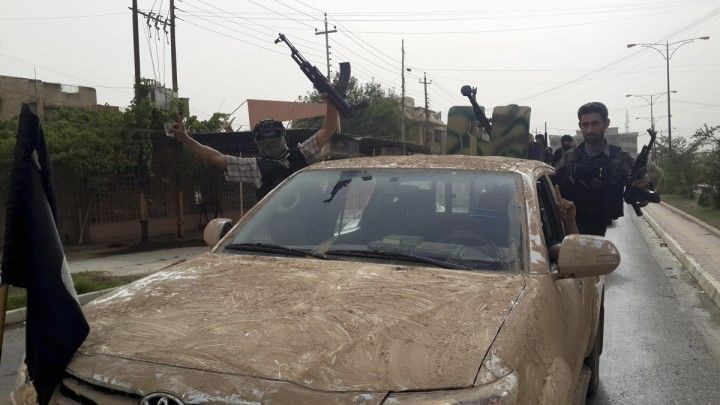Six Months After The Fall Of Mosul, ISIS Is Stalled, Unable To Seize Baghdad

The militants, dressed in all black with face masks on, entered the city of Mosul riding in old pickup trucks. They waved the now infamous black flag, the emblem of the Islamic State group, as Iraqi army soldiers fled before their advance, leaving armored vehicles and weapons behind. Exactly six months ago today, the second-biggest city in Iraq fell to the Sunni radical group, which rapidly went on to carve out what it calls a "caliphate" that extends from Aleppo in Syria all the way to the outskirts of Baghdad. But now their advance is stalled, due to U.S.-led coalition airstrikes and the challenges of governing the land they have seized.
After the group also known as ISIS or ISIL took Mosul, it began a campaign of insurgency that forced hundreds of thousands to flee their homes, and it staged executions and mass killings of such brutality that the U.S. (along with allies, including France, Great Britain and Australia) decided to resume involvement in Iraq after ending its presence there in 2011. The Pentagon said that the bombing campaign so far has cost more than $1 billion, and some military experts have predicted that the war against the group will last more than three years.
A large portion of that U.S. expenditure supports the almost 2,000 soldiers assisting the Iraqi military in noncombat roles. The number of soldiers aiding in the fight is expected to surpass 4,000.
But even without American help, Iraq so far has managed to stop Islamic State militants from taking the biggest prize, the city of Baghdad.
In June, ISIS marched toward the capital, taking town after town as the government of then-Prime Minister Nouri al-Maliki dithered. But Iraqi forces and Iranian-backed Shiite militias protecting the capital succeeded in halting the advance, and ISIS has since had to resort to urban warfare tactics such as suicide attacks and car bombs in the city. Unable to attack Baghdad frontally using the tanks and armored vehicles it seized, it has begun a guerrilla campaign that hasn't yet produced results.
So far, the U.S.-led coalition has conducted more than 1,000 airstrikes against ISIS in Iraq and Syria, targeting its oil refineries and training camps. Senior U.S. officials have said that the airstrikes are working and are slowly degrading and destroying the Sunni militant group. Yet, with anywhere between 10,000 and 20,000 soldiers, a war chest worth hundreds of millions of dollars and access to oil and weapons, ISIS is nowhere near being defeated.
Along the way to Baghdad, ISIS gained supporters, many of them Sunni Iraqis who wanted to take revenge against the Shiite-dominated Iraqi government. Many Sunnis in northern Iraq told International Business Times in June, mere days after the fall of Mosul, that they would rather have ISIS rule their territory than the government of al-Maliki, a Shia who had antagonized the Sunni minority for years. Al-Maliki has since been replaced by Haider al-Abadi, a fellow Shia whose policies have proved far less divisive.
The group even gained support from Westerners who have moved to the caliphate to wage war, and it is urging Muslims in the West to take armed action as well.
An emblematic case was that of André Poulin, a Canadian who converted to Islam. He first appeared on YouTube in Syria last year, saying Allah had pulled him to go to Syria to fight for ISIS in that country's civil war against the forces of President Bashar Assad, a member of a Shia offshoot sect called the Alawites. Poulin was just one of several Westerners to join the Islamic State group, which at the time was just a small group of extremists vying for power. Now ISIS has many more Western fighters. Dozens of young men from places such as London and Minnesota have left their homes to join the group.
The rise of the Islamic State group has prompted Barack Obama to say that ISIL is one of the biggest threats America faces. “ISIL is a terrorist organization, pure and simple. And it has no vision other than the slaughter of all who stand in its way,” the president said in an address to the nation in September.
ISIS militants have killed men, women and children, Muslims and Christians alike and ethnic minority groups, both in Syria and Iraq. It has killed Americans, including James Foley, a freelance journalist who was the first in a line of many journalists, both Western and not, to be brutally murdered by the group and broadcast on video for the entire world to see.
IBTimes reported in early November that at least 1,000 people had been executed in Iraq alone. That number has most likely risen and does not include all those who have been killed in Syria. And that remains, at this point, the biggest unknown about ISIS: Nobody -- no group, official or government -- has been able to count just how many people it has killed.
© Copyright IBTimes 2024. All rights reserved.





















